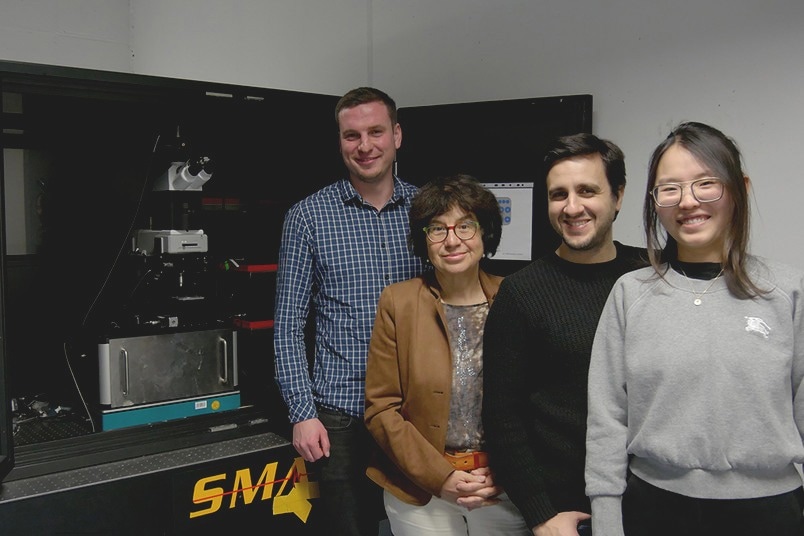Reviewed by Lexie CornerApr 12 2024
The switch to renewable energy sources requires the optimization of electrochemical processes. Potential differences and electric currents are utilized to bind and initiate reactions in electrochemical processes. Sustainable chemistry requires electrochemistry as a prerequisite for the production of hydrogen and battery technology. Even though there has been a lot of scientific advancement in this field recently, more work must be done before large-scale industrial applications are possible.
 The authors from the RESOLV Cluster of Excellence: Steffen Murke, Martina Havenith, Simone Pezzotti and Wanlin Chen (from left). Image Credit: RESOLV, Kasper
The authors from the RESOLV Cluster of Excellence: Steffen Murke, Martina Havenith, Simone Pezzotti and Wanlin Chen (from left). Image Credit: RESOLV, Kasper
Researchers from the École normale supérieure in Paris and the Ruhr University Bochum’s Cluster of Excellence RESOLV have identified two novel strategies for managing and optimizing electrochemical processes at electrified interfaces. Their findings are presented in the online edition of the Journal of the American Chemical Society, released on April 10th, 2024. The journal has selected the article to appear on the front cover.
Surface Sensitive Spectroscopy
To better understand the complicated behavior of molecules at electrified metal/water contacts, the researchers looked at a crucial metric known as the acid dissociation constant (pKa). Whereas this value is widely known in bulk solutions, it has been theorized that this parameter, critical for acid/base chemistry, might vary significantly in the vicinity of electrodes.
However, detecting pKa values under electrochemical conditions is an experimental challenge. To address this, the Havenith group integrated improved surface-specific spectroscopic methods, particularly Surface-Enhanced Raman Spectroscopy (SERS), with theoretical modeling.
The results differ depending on the voltage applied. The chemistry between acids and bases at electrified surfaces differs noticeably from bulk solution chemistry.
Hydrophobic Layer and Strong Electric Fields
Their results emphasize the importance of two major mechanisms—the influence of large local electric fields and the effect of local hydrophobicity—that control acid-base reactions at electrified interfaces.
Through the analysis of glycine molecules’ protonation and deprotonation, the researchers saw a hydrophobic water/water interface at the metal surface, which caused the zwitterionic glycine forms to become unstable. The impact increases with an increase in the applied potential.
Their findings highlight the variations in local solvation characteristics at metal/water interfaces, opening up new possibilities for electrochemical reactivity adjustment. These discoveries provide new options for enhancing electrochemical processes and creating innovative catalysis techniques, as both factors can be tuned in a controlled way.
Funding
This research was supported by Deutsche Forschungsgemeinschaft (DFG, German Research Foundation) under Germany’s Excellence Strategy EXC-2033 – 390677874 – RESOLV, by the “Center for Solvation Science ZEMOS,” funded by the German Federal Ministry of Education and Research BMBF and by the Ministry of Culture and Research of Nord Rhine-Westphalia MKW NRW. W.C. and M.H. acknowledge the Alexander von Humboldt Foundation (AvH) for the research fellowship under the Henriette-Hertz-Scouting Program. S.P. acknowledges funding by the European Research Council (ERC, ELECTROPHOBIC, Grant Agreement No. 101077129) supported the study.
Journal Reference:
Murke, S., et al. (2024) Tuning Acid–Base Chemistry at an Electrified Gold/Water Interface. Journal of the American Chemical Society. doi:10.1021/jacs.3c13633